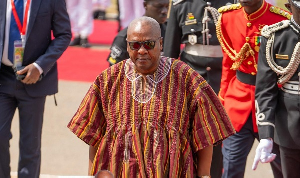Takoradi, Dec. 18 -GNA-Mr. Bright Blewu, General Secretary of the Ghana Journalists Association (GJA) has said inaccurate reportage, disregard for societal norms and other unethical behaviour were having negative effects on journalism and the GJA as a whole.
He said the criticisms and the frequent calls for a stiffer law to punish journalists should remind journalists that they are accountable. Mr. Blewu said these at a day's seminar organised jointly by the Western Regional branch of the GJA and the Ethics and Disciplinary Council (EDC) for journalists and selected radio presenters in the Shama Ahanta East Metropolis and sponsored by the United Nations Development Programme (UNDP).
It was on the theme: "The Role of Ethics in Journalism". He said journalists could improve their performance by abiding by the code of ethics of the profession and through further education.
Mr. Blewu said media accountability formed part of the country's democratic governance and reminded the media to be fair, objective and neutral in the discharge of their duties.
He said the media was vital and should continue to contribute towards the growth and sustenance of the country's democratic process. Mr. Blewu reminded radio presenters not to engage in provocative, tribal or ethnic programmes that could lead to conflicts and abuses.
Dr. Anthony Bonnah Koomson, Chairman of the GJA EDC, speaking on the "GJA Code, and Common Ethical Violations said the code of ethics must be learnt by all journalists and they should abide by them.
He said journalism forms part of good governance and there should be no attempt to license journalists before they practice.
"Once journalists licensed, the freedom and independence of the media would be curtailed and manipulation of the media would be easier," he stressed.
Dr. Bonnah Koomson reminded journalists to be professional by being thorough in their works to prevent the public from "unnecessarily criticising the journalist".
He said journalists must have a value for themselves to enable them to court the respect of others.
Dr. Bonnah-Koomson said the frequent display of partisan ideas and opinions by some journalist's exposes their neutrality. Journalism should be all-inclusive and must not ignore or deprive sections of the public access to the media.
Dr. Bonnah-Koomson said, "under-cover" journalism must be in the national interest, should not endanger the life of another person and should be done if there is no other way.
Mrs. Marian Kyei, a member of the EDC reminded journalists not to abuse or violate rules that could endanger them.
She said advertisements placed in children's programmes should be carefully monitored to prevent the children from exploitation and deception.
Mrs. Kyei said the content of some children's programmes needs special attention to safeguard the morality of children. She reminded journalists that the National Media Commission (NMC) exists to assist in the settlement of disputes but when journalists ignore them, they could be prosecuted in court.
Mrs Kyei urged all journalists to support the NMC and the GJA to achieve its respective goals of improving journalism standards and professional competencies.
Mr. Emmanuel Dentu, Deputy Chairman of the EDC said good taste and decency should be the hallmark of every radio station presenter. He said presently, the use and promotion of obscene songs and language on some radio stations needs to be checked.
Mr. Dentu said self-regulation and good sense was needed by all to check obscenity in whatever form.
He reminded broadcast journalists to be sensitive to the audience, while monitoring and supervision should become part of every media organisation.
Mr. Dentu suggested that private radio stations should dismiss its incompetent staff to avoid lawsuits.
Regional News of Monday, 18 December 2006
Source: GNA
















